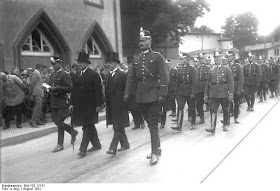The man who stalked Goebbels
By Ouri Wesoly
They
are hardly remembered, mainly because they have lost. Yet they
were heroes whose stubborn and courageous struggles deserved more
than a footnote in history books. Like those of the Chief for the
Berlin Police, Bernhard Weiss.
If
we looked for an example of a perfectly integrated Jewish family in
Germany at the beginning of the 20th century, the Weiss would be an
excellent example.
Especially the eldest son, Bernhard, born in Berlin in 1880 and a lawyer by training. With his two brothers, he engaged himself from the beginning of the war 1914-18, reached the rank of captain and even obtained the Iron Cross of 1st class (One of his brothers was killed and the other wounded).
Especially the eldest son, Bernhard, born in Berlin in 1880 and a lawyer by training. With his two brothers, he engaged himself from the beginning of the war 1914-18, reached the rank of captain and even obtained the Iron Cross of 1st class (One of his brothers was killed and the other wounded).
In
1918, he was appointed deputy director of Kripo, the criminal police
of Berlin. His mission: to restore order in a German capital, beset
with bloody riots, like the rest of the country. Germany had lost the
war, the Kaiser was on the run, far-right and extreme left were
trying to seize power by arms by overthrowing the fragile
parliamentary regime, the Weimar Republic.. And of course, the
underworld then had free reins.
Bernhard
Weiss - the first non converted Jew to gain access to such a high
position - did wonders in his new job and climbed quickly in his
hierarchy. After leading the political police, he became head of all
the police in the capital. He blew a wind of modernity in the fight
against crime. He introduced the latest advances in science,
microscope, blood tests, lie detectors, and so on. And, in a few
years, he turned the Kripo into an instrument as effective as the
well-known British Scotland Yard.
But
his role was not limited, by far, to hunt down criminals. B. Weiss
was one of the few senior officials to loyally defend the Republic.
And when in 1926, the Nazi party decided to settle in Berlin, he
comes into conflict with Joseph Goebbels, an anti-Semitic madman.
Until then, in fact, the movement of Hitler raged mainly in Bavaria,
in the south of the country. But the real power was in the capital,
where the party had only a few hundred members.
 |
|
By
Bundesarchiv, Bild 102-12161 / CC-BY-SA 3.0, CC BY-SA 3.0 de,
https://commons.wikimedia.org/w/index.php?curid=5480355
|
40 lawsuits against Goebbels.
A
tough challenge therefore, according to Goebbels for whom, outside of
Moscow, "Berlin is the reddest city in Europe". Did not
Social Democrats and Communists get more than 52% of the votes in the
1925 municipal elections? Though it should not be forgotten that both
formations considered each other as an enemy ...
Be
that as it may, Goebbels arrives with the will to sow violence in the
capital by launching the Nazi militia, the SA, against the
Communists. But B. Weiss did not let him. In 1927 he got 500 SA
arrested for belonging to an illegal organization. But the Nazis
circumvent the measure by regrouping in various sports or cultural
organizations.
Nevertheless,
this is enough to arouse the fury of Goebbels who therefore
systematically attacks the police and especially Bernhard Weiss,
Jewish and « leftist ». With the « finesse »
characteristic of the extreme right, German or not, he calls him
"Isidor". A name supposedly Jewish that makes the Nazis
roar with laughter and arouses innumerable texts or songs offensive
and insulting. B. Weiss retaliates by becoming the most energetic
opponent of Goebbels.
He
has him sentenced for defamation. The police supervise the Nazis,
search their premises, confiscate all that can be used as weapons (it
does the same with the Communists.) Between 1927 and 1932, Weiss also
attacks Goebbels more than 40 times in court and wins with
regularity. He repeatedly obtains that justice prohibits the Nazi
leader from speaking in public.
But
if he wins all these battles, Weiss, as we know, will eventually lose
the war: the rise of Nazism is irresistible. Then, in January 1933, a
few days before Hitler came to power, he fled.
His
former police force, now in the hands of Hermann Goering, stalks him,
and Goebbels offers a reward for his arrest. But B. Weiss manages to
get to Czechoslovakia and then England.On August 25, 1933, the Nazi
regime deprived him of his German nationality at the same time as
Albert Einstein and the prestigious journalist Georg Bernhard
(editor-in-chief of the Vossische Zeitung). He will live long enough
to witness the fall of Nazism and the suicide of his eternal enemy.
Then,
forgotten by all, he died of cancer in London on July 29, 1951, a few
days after the Federal Republic of Germany restored his citizenship.
Today, the forecourt of two of Berlin's railway stations bear his
name.
A
plaque was affixed to the house where he lived. In 2005, filmmaker
Reiner Mathias Brueckner dedicated a film to this resolute advocate
of democracy. Its title is "The man who hunted Goebbels". A
good summary of Bernhard Weiss’ life.
Link to Ouri Wesoly's article:


No comments:
Post a Comment